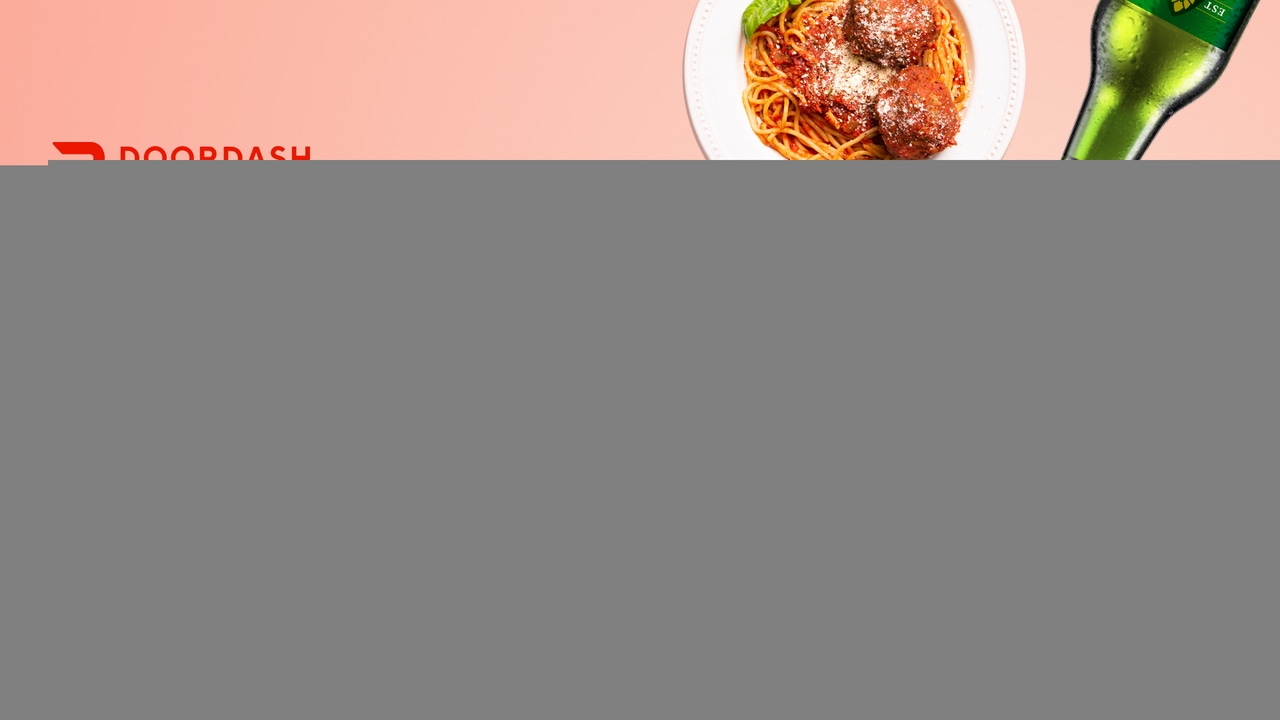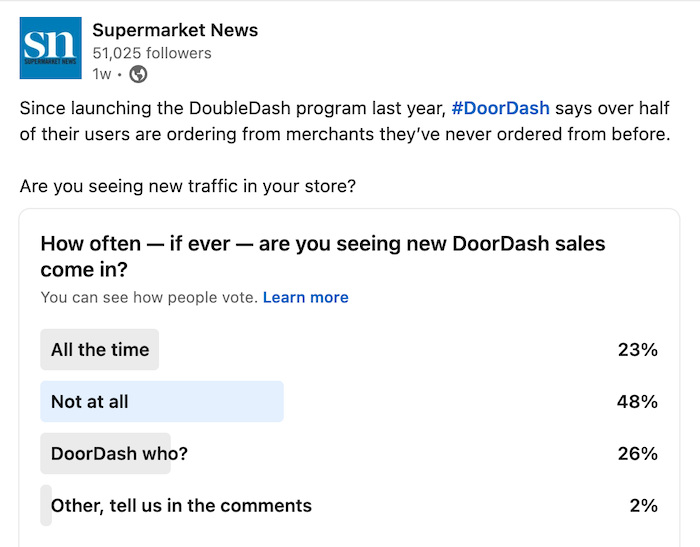DoorDash’s new alcohol boost has limits for grocery
State regulations are potentially cramping supermarkets’ ability to cash in on alcohol delivery sales

TOP TAKEAWAYS
The alcohol category is hot, but regulations limit delivery’s reach for grocery
More supermarket partnerships are coming for DoorDash
But a recent SN LinkedIn poll indicates that retailers do not view the delivery service as a driver of new sales
Supermarkets are poised to jump on the alcohol delivery bandwagon — but whether they’re allowed to go along for the ride depends largely on what states and sometimes even the county courthouse will let them do.
DoorDash is getting a head start, so to speak, by adding alcoholic beverages to the predominantly restaurant food orders it’s delivering around the country in a new initiative it calls Drinks with DoubleDash, an expansion of its year-old DoubleDash platform that bundles food orders with groceries, snacks and other goodies, and now alcohol too. Supermarkets are an integral — and potentially highly profitable — part of the game plan.
Drinks with DoubleDash works like this. Consumers select a meal from a restaurant, scroll to the bottom of the menu to browse alcoholic beverage options from a nearby grocery, liquor or convenience store, and then add the beverage to the order and continue to checkout — all in a single order with no additional delivery fee or order minimum.
“This is an exciting time especially when you start hearing about DoorDash’s program with alcohol delivery and what’s taking place post-pandemic in terms of alcohol and beverage,” said Ross Cloyd, North America retail director for the grocery channel at Kantar, a data and consulting company. “It’s a tremendous opportunity.”
Cloyd said the trend really got started when drinks-to-go programs kept restaurants functioning during the Covid lockdowns, and states enacted emergency laws to allow that. And now, a lot rides on what retailers can or cannot do in many localities, and when and if lawmakers can be persuaded to change the rules.
“State laws are obviously going to play an impact,” Cloyd said. “Does my area support having, whether it’s at the county or state level, delivery of alcohol with drinks or purchasing wine bottles or beer? There’s so much confusion with the alcohol laws. What are those laws and do new laws need to be enacted?”
DoorDash, for example, is available in 23 states and the District of Columbia — in other words in the states where it’s legally permissible for it to deliver alcohol, and merchants to sell it.
Laws on alcoholic beverage sales vary widely across the country, and some states — like Iowa — are starting to do something about it.
“They’re realizing now how much alcohol, especially craft beer, is a part of their revenue stream,” Cloyd said. “They’re enacting legislation to open opportunities for the craft beer locations to distribute directly to grocery stores versus going through a distributor.”
Cloyd said other localities should follow suit and he encourages retail businesses to get involved.
“The biggest piece is going to be is getting local or state governments to pass legislation to open that up,” he said. “First and foremost, legislation and lobbying by the grocery industry should push legislators to enact laws to open this up.”
More supermarkets partner in delivery
After an initial heavy focus on convenience-store participation, DoubleDash now has an ever-increasing stable of supermarket chains available for alcohol purchases — and anything else deliverable. After partnering with Albertsons Cos. and Grocery Outlet months ago, the delivery company recently added Giant Eagle, Raley’s, Sprouts Farmers Market and Weis Markets to its lineup, and observers anticipate more will come.
The Kantar analyst sees delivery—and now alcoholic beverage delivery too—as a direct result of changing shopping habits triggered by the pandemic.
DoorDash estimates adding alcohol to the order increases the average customer order values by up to 30% for grocers and restaurants, and over 50% for convenience stores, so delivery is starting to bloom in the alcohol business, which is booming in other ways, too.
“We’re seeing retailers that are expanding out their wine departments and putting in more of a premium experience with wooden fixtures, also having endcaps or displays throughout the store,” Cloyd said. “You have those impulse sales, and they’re also incorporating it in coolers to have chilled wine or beer and, depending on what state, have licenses for spirits. It’s a hot category.”
Cloyd said he also expects national and regional players to test the idea of a supermarket drive-thru lane.
“What if we convert part of our store to have a drive-thru type fast-food or quick-service restaurant, where you have the pizza or prepared chicken ready to go but you also have alcoholic drinks ready to serve,” he said. “It’s fascinating.”
According to DoorDash, more than half of its DoubleDash users are first-time customers of merchants taking their add-on orders.
But a recent SN LinkedIn poll indicates that the majority of grocery retailers aren’t seeing the benefits of those new customers. When asked, “How often—if ever—are you seeing new DoorDash sales come in?” 48% of respondents said “not at all,” with just 23% responding “all the time.”

**
Are state regulations impairing your store’s ability to participate in DoorDash or other alcohol delivery options? Let us know in the comments below or email SN Executive Editor Chloe Riley at [email protected].
About the Author
You May Also Like






